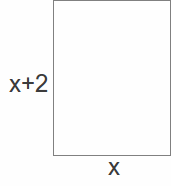More advanced problem solving questions involve simultaneous equations or quadratics.
Example: The height of a rectangle is 2 cm longer than the base. If the area is 48 cm2 find the length of the base.
If the base is![]() the height is
the height is![]()

The area is![]() and equating this to 48 gives
and equating this to 48 gives![]() Expanding the brackets and subtracting 48 gives
Expanding the brackets and subtracting 48 gives![]()
We can factorise this expression to give![]() Equating each factor to 0 gives
Equating each factor to 0 gives
![]()
![]()
We cannot have a negative length so![]() This leaves
This leaves![]()
Example: Two pens and three pencils cost 57 pence. 1 pen and four pencils cost 51 pence. Find the cost of a pen and the cost of a pencil.
Let![]() be the cost of a pen and
be the cost of a pen and![]() be the cost of a pencil. The first sentence gives
be the cost of a pencil. The first sentence gives
![]() (1)
(1)
The second sentence gives
![]() (2)
(2)
(1)-2*(2)
![]()
Substitute into (2)
![]()
